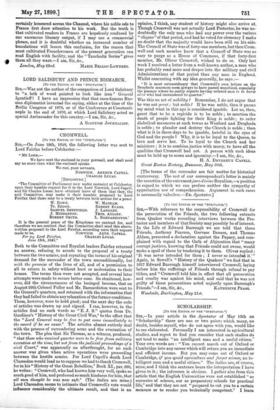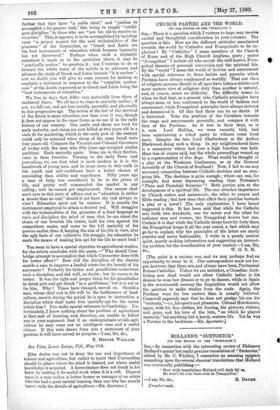SCHOLARSHIP.
[TO THE EDITOR OP TUE "SPECTATOR.")
SIR,—In your article in the Spectator of May 13th on "Scholarship" there are one or two points which many, no doubt, besides myself, who do not agree with you, would like to see elaborated. Personally I am interested in agricultural studies, and regret to find you consider that such studies do not tend to make "an intelligent man and a useful citizen." Your own words are : "You cannot march out of Oxford or Cambridge into any career which will return you an immediate and efficient income. But you may come out of Oxford or Cambridge, if you avoid agriculture and forget science, an in- telligent man and a useful citizen." The italics are, of course, mine, and I think the sentence bears the interpretation I have given to it ; the inference is obvious. I gather also from this article that the English Universities were not established "as nurseries of science, nor as preparatory schools for practical life," and that they are not "prepared to cut you to a certain measure or to render you technically competent." I learn further that they have "a noble ideal," and "profess to accomplish a far greater task," this being to supply "intelli- gent discipline" to those who are "not too old to receive in- struction." This, it appears, is to be accomplished by insisting upon "a proper respect for the arid technicalities of the grammar" of the humanities, as "Greek and Latin are the best instruments of education which humane ingenuity has yet discovered." Perhaps when such a dogmatic statement is made as in the quotation above, it may be "practically useless" to question it ; but I venture to do so because the whole tenor of the article is to advocate and advance the study of Greek and Latin because "it is useless" ; and no doubt you will give us some reasons for making so emphatic a statement in response to the "complete useless- ness" of the doubt expressed as to Greek and Latin being the "best instruments of education."
We live in days that differ very materially from those of medimval times. We all have to come to maturity earlier ; if not, we fall out, and get lost socially, mentally, and physically in this progressive age. The action of the law of the survival of the fittest is more relentless now than ever it was, though it does not appear in the same forms as we see it in the early history of our country. Our cattle and sheep are bred for early maturity, and sheep are now killed at two years old in a state fit for marketing, which in the early part of the century could only be attained when sheep of the same breed were four years old. Compare the Viceroys and Colonial Governors of to-day with the men who fifty years ago occupied similar positions. Early maturity again. Some are in their thirties, some in their twenties. Turning to the daily Press and journalism, we see that what is most modern in it is the handiwork of young men, and in some cases in this walk in life youth and self-confidence have a better chance of succeeding than ability and experience. Fifty years ago a man of forty was considered to be in the prime of life, and pretty well commanded the market in any calling; now he cannot get employment. One cannot shut one's eyes to this state of affairs, and as "education is rather a means than an end," should it not have the end always in view Education must not be aimless. It is usually the instrument employed to attain a desired end. Will struggles with the technicalities of the grammar of a dead language so train and discipline the mind of man that he can stand the strain of our feverish life better, hold his own against his competitors easier, and come to the full maturity of his powers earlier, than if, keeping the aim of his life in view, also the ugly facts of our collective life-struggle, his education be made the means of making him apt for the life he must lead You seem to have a special objection to agricultural studies, for the article concludes with the very,—" Why should Cam- bridge attempt to accomplish that which Cirencester does with far better effect ? " How will the discipline of the classics enable a man to improve a landed estate for the benefit of his successors? Probably his father and grandfather underwent such a discipline, and did well, no doubt ; but he wants to do better. It was the right and proper thing for his grandfather to drink port and get drunk "as a gentleman," but it is not so for him. Why? Times have changed, moved on. Should a man, whose chief end in life will be the furtherance of land- culture, receive during the period he is open to instruction a discipline which shall make him specially apt for the career before him You make special reference to Cambridge. Un- fortunately, I know nothing about the position of agriculture st that seat of learning, and, therefore, am unable to follow you in your argument that if an undergraduate avoids agri- culture he may come out an intelligent man and a useful citizen. If this note draws from you a statement of your position it will have served its purpose.—I am, Sir, &c., R. HEDGER WALLACE.
Sea View, Lower Largo, Fife, May 17th.
[Our desire was not to deny the use and importance of science and agriculture, but rather to insist that Universities should be places where the mind is trained, not where useful knowledge is acquired. A horse-trainer does not break in his horse by making it do useful work when it is a colt. Depend upon it, a man makes a better farmer or manager of an estate who has had a good mental training than one who has merely learnt early the details of agriculture.—ED. Spectator.]







































 Previous page
Previous page